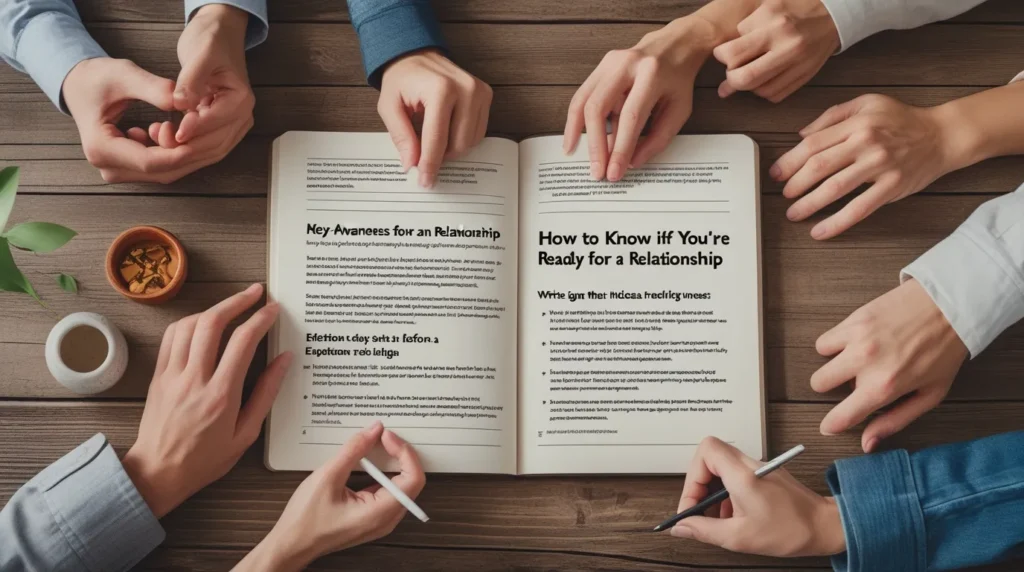Know If You’re Ready for a Relationship
Deciding to enter a serious relationship is one of life’s most significant choices, and it’s a decision that should be approached with thoughtfulness and self-awareness. Often, people rush into dating because of societal pressure, a fear of loneliness, or the desire to find someone to “complete” them. However, a truly healthy and lasting partnership begins with two whole individuals. Relationship readiness isn’t about age or finding a “perfect” person; it’s about your own emotional maturity, stability, and capacity to share your life with another person in a meaningful way. The following guide will explore the key signs that indicate you are truly prepared to open your heart and commit to a healthy, reciprocal relationship.
Building the Foundation: A Solid Sense of Self
The cornerstone of relationship readiness is a strong and secure relationship with yourself. You cannot expect a partner to be your sole source of happiness, validation, or emotional fulfillment. When you are content and secure in your own company, you enter a relationship from a place of want rather than need.
One of the most telling signs of readiness is self-love and acceptance. Do you understand your own core values, interests, and long-term goals? Are you comfortable with your strengths and accepting of your imperfections? If you know who you are and what you stand for, you’re less likely to lose yourself in a partnership or settle for someone who doesn’t align with your authentic self. Furthermore, being genuinely content with being alone is a powerful indicator. If you are only seeking a partner to escape loneliness, you risk forming a co-dependent dynamic. True readiness means you are happy as a single person, and a relationship will be a wonderful addition to an already fulfilling life.
Clearing the Path: Resolving Past Baggage
A new relationship is not an emotional baggage claim. Before committing to someone new, it is essential that you have moved on from past hurts and exes. This means more than just being physically separated; it means the anger, resentment, or sadness from previous breakups has been processed and resolved. If you are still mentally or emotionally consumed by an ex, you will inevitably bring that unresolved emotional weight into your new connection, which is unfair to both yourself and your new partner.
It’s crucial to take the time for personal growth and self-reflection after a significant breakup. Ask yourself what you learned about yourself and what you truly need in a partner. Emotional stability is key; if you are currently dealing with significant unresolved personal trauma or high emotional volatility, it may be better to focus on self-healing first. A partner should complement your life, not be an amateur therapist tasked with “fixing” you or your past wounds.
Essential Relationship Skills: Communication and Boundaries
A strong, healthy relationship requires practical skills, the most important of which is effective communication. Readiness means you are not only comfortable expressing your feelings, needs, and dreams openly and honestly, but you are also a good listener. Can you receive feedback and vulnerability from a partner with empathy, without becoming defensive or personalizing their emotions? The ability to have healthy conflict—where you can argue fairly and respectfully to resolve an issue, not just win a fight—is a non-negotiable skill for long-term partnership success.
Hand-in-hand with communication is the ability to set and respect healthy boundaries. Do you know when and how to say “no” to protect your own space and time? Do you respect a partner’s boundaries when they set them? Strong personal boundaries ensure that you maintain your sense of self within the relationship and prevent toxic or disrespectful behavior. Readiness means you are confident in standing up for yourself while also being ready to compromise. Relationships are a partnership of give-and-take. You must be willing to meet your partner halfway, valuing their opinions and preferences just as much as your own, particularly on non-core issues.
The Right Mindset: Intentions and Flexibility
Finally, your intention for seeking a relationship must be healthy. A ready person is not looking for a checklist-perfect ideal; they are not beholden to a rigid checklist but are instead open to a wider range of partners who share compatible core values. Your motive should be to share your love and life with another person, not to fill an emptiness or achieve a social milestone.
Readiness also means being ready for commitment and vulnerability. Are you prepared to be 100% committed to one person? Are you willing to open your heart, knowing that there is an inherent risk of getting hurt? A mature approach also means accepting the inevitable ups and downs of dating. You understand that chaos is a turn-off, and stability is the goal. You value consistent, reliable effort over dramatic highs and lows, signaling that you are ready for a deep, mature, and meaningful connection.
Final Thoughts
Ultimately, the question of whether you are ready for a relationship can only be answered by you. It requires honest introspection and a willingness to acknowledge where you stand emotionally, mentally, and perhaps even financially. True readiness is less about a frantic search for “the one” and more about arriving at a place of calm, self-assured independence. When you are a whole person, ready to share your life with another whole person, you are in the best possible position to attract and sustain a love that is healthy, balanced, and truly fulfilling. Don’t rush the process; the most important relationship you’ll ever have is the one with yourself, and that is the foundation for all others.

